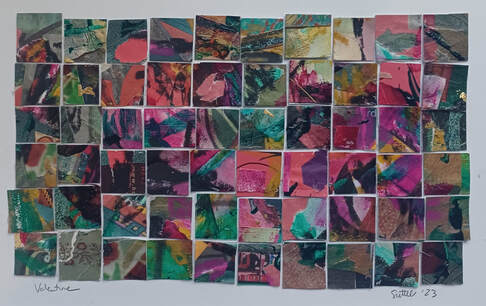Hafsa Zulfiqar | Mother’s Voice Hands In Its Resignation
Mother’s lost her voice,
grief curdling on her tongue,
slurred words, discomfort, shame,
lingual dystonia: a movement disorder.
Father calls her parrot when he means crow,
out of love, she says, a terrible liar.
I am a terrible liar,
donning a gentle voice,
pretending to be a nightingale but always a crow.
And do you ever get tired of keeping your tongue
to yourself? I ask mother. Prying is a disorder,
she stutters, slipping on her ds in shame.
Crossing oceans, I return with a colonized mouth, shame
puncturing my body, walking as an apologetic liar,
hopscotching between languages, a disorder
in the making. Mother’s voice
unable to soothe, teach, touch my tongue
and put the Sindhi lilt back into this crow.
A story of a nightingale morphing into a crow
after a plague of death in the family; what a shame,
he was the youngest sibling, they say, funeral rice on their tongue.
The doctors say, genetic, can be inherited, liar,
Mother whispers, but warns my voice
anyway, make notes for the signs of disorder.
I dread forgetting her (songs), but after the disorder,
she says, in some ways I’m already dead. A crow
caws on the neem tree, wind’s restless voice
singing a duet of shame
through mother’s window, a liar
passes by speaking in a foreign tongue.
Mother’s tongue is failing to speak mother tongue,
my winter, her summer paranoid writing symptoms of the disorder,
constantly asking ourselves, Am I a writer or a liar?
I avoid looking up at a crow,
what if I see mother and her shame?
Instead, I look up how to birth a voice.
In a snowstorm, my phone rings, a muffled voice,
all the words on mother’s tired tongue for tired, tired of shame,
the disorder is no liar, she says, as I paint a crow.
grief curdling on her tongue,
slurred words, discomfort, shame,
lingual dystonia: a movement disorder.
Father calls her parrot when he means crow,
out of love, she says, a terrible liar.
I am a terrible liar,
donning a gentle voice,
pretending to be a nightingale but always a crow.
And do you ever get tired of keeping your tongue
to yourself? I ask mother. Prying is a disorder,
she stutters, slipping on her ds in shame.
Crossing oceans, I return with a colonized mouth, shame
puncturing my body, walking as an apologetic liar,
hopscotching between languages, a disorder
in the making. Mother’s voice
unable to soothe, teach, touch my tongue
and put the Sindhi lilt back into this crow.
A story of a nightingale morphing into a crow
after a plague of death in the family; what a shame,
he was the youngest sibling, they say, funeral rice on their tongue.
The doctors say, genetic, can be inherited, liar,
Mother whispers, but warns my voice
anyway, make notes for the signs of disorder.
I dread forgetting her (songs), but after the disorder,
she says, in some ways I’m already dead. A crow
caws on the neem tree, wind’s restless voice
singing a duet of shame
through mother’s window, a liar
passes by speaking in a foreign tongue.
Mother’s tongue is failing to speak mother tongue,
my winter, her summer paranoid writing symptoms of the disorder,
constantly asking ourselves, Am I a writer or a liar?
I avoid looking up at a crow,
what if I see mother and her shame?
Instead, I look up how to birth a voice.
In a snowstorm, my phone rings, a muffled voice,
all the words on mother’s tired tongue for tired, tired of shame,
the disorder is no liar, she says, as I paint a crow.
Hafsa Zulfiqar hails from Pakistan and graduated from Bennington College where she studied literature and psychology. Her work which has received the WNDB Walter Grant and a Pushcart nomination explores brown identity, dreams, language, liminality, and above all the notion of home; it can be found or is forthcoming in AAWW: The Margins, The Offing, Pidgeonholes, Columbia Journal, South Dakota Review, Fractured Literary, Kissing Dynamite, & Anti-Heroin Chic. She serves on the staff of Brooklyn Poets & Muzzle Magazine. You can find her on Twitter @HafsaZUnar and @vibingwithabook on Instagram.
Kim Suttell is a collagist just emerging from a career in bureaucracy and spreadsheets. Paper, as her medium, speaks in torn edges, subtle curls, and tiny glimpses of previous use. The grid template references both quilts and ledgers, places where individual pieces must interact to create a new whole. It is the point to limit the format so that color, texture, and fragmentary images make their own movement and meaning.
Instagram: Page48paperart
Instagram: Page48paperart

